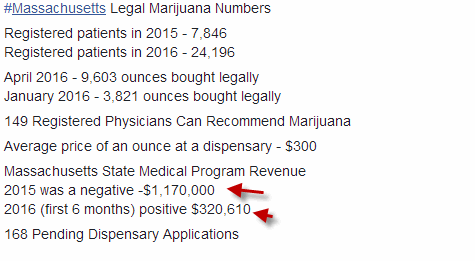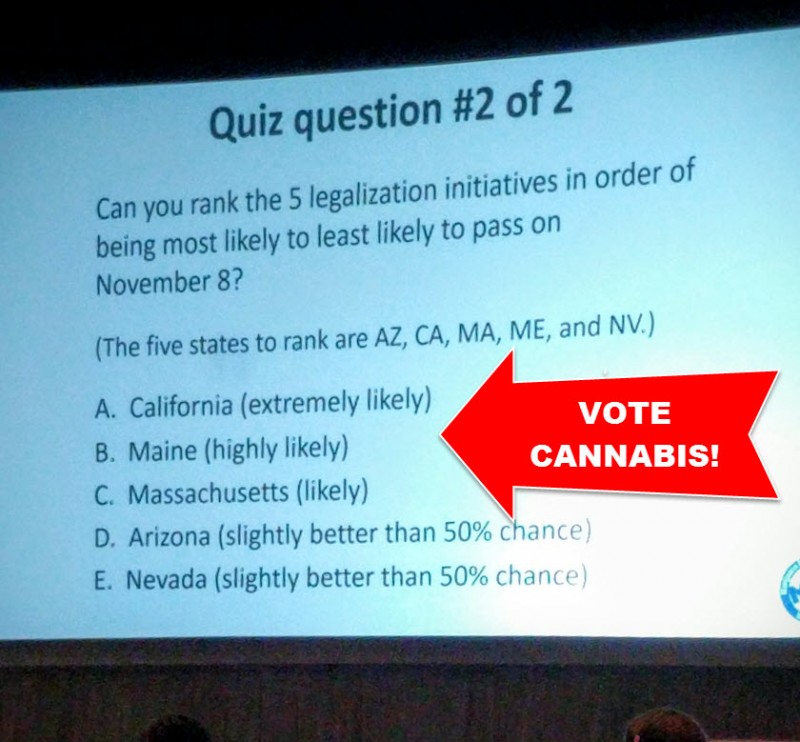What You Need To Know About The 9 States Voting On Marijuana Legalization This November

I’m not sure about you, but I can definitely feel the heat of the upcoming election. Nine states will be helping plant the seeds on legalization as they vote on ballot initiatives to regulate marijuana. It’s an exciting time for ganjapreneurs as well as all those in the community who have been working so hard with high hopes of one day finally legalizing the plant - and making it more accessible to those who need it.
Recent polls show that these ballot initiatives have enough support from voters, although let’s be realistic: it’s still pretty hazy that all of these will pass.
For now, let’s weed out these initiatives and get the current facts on each of them:
Recreational Initiatives
Five states will be voting on recreational use of marijuana. If all of these are passed, there would be a total of nine states in the country that would allow for recreational cannabis use. Currently, the only states that allow adults to buy pot at licensed stores include Washington, Colorado, Alaska, and Oregon.

California, Proposition 64, “Adult Use of Marijuana Act” (AUMA)
If all goes well, the AUMA will allow recreational use of marijuana for adults 21 and above starting 2018, and will legalize cannabis and hemp. The Bureau of Marijuana Control would oversee dispensaries while commercial cultivation and licensing will be handled by the Department of Food and Agriculture. Adults would be permitted to grow up to 6 marijuana plants at home for personal use but California’s municipalities can still regulate various aspects of home cultivation. The AUMA has provisions for marketing as it will ban dispensaries and ads 600 feet from schools.
Under Prop 64, current medical marijuana patients will need to get a new prescription from doctors which will have to meet the new rigid standards by January 1, 2018. Medical marijuana providers will be able to apply for tax exemptions. The act would also allow a destruction of records for minor marijuana convictions as well as possible resentencing.
The prospects for California do look good - it is after all, the pioneer of the marijuana movement in the United States AND the largest consumer of pot. In fact if you took into consideration the revenue that California’s legal marijuana market has brought in then that would already be equivalent to the 8th biggest annual GDP in the world. Adding a legal marijuana market will increase that at least a thousandfold as it would tap millions of new users and give Uncle Sam a massive population for marijuana research test subjects.
Nevada, Question 2, “Initiative to Regulate and Tax Marijuana.”
Question 2 would allow for possession as well as adult use, and The Department of Taxation will be in charge of issuing licenses and coming up with standards for qualification. The program will allow adults to grow up to 6 plants or 12 per home provided that they are 25 miles from a dispensary.
Public use is not allowed, violators will be slapped with a $600 penalty. Through zoning and land use laws, the local government of Nevada would be able to ban marijuana-related businesses 1,000 feet from schools. Up to 80 retail licenses can be issued in counties that are home to a population of over 700,000.
Counties with less than 700,000 but over 100,000 can be issued up to 20 licenses. At most, 4 dispensaries will be permitted in counties with a population of less than 100,000 but over 55,000, while 2 dispensaries will be allowed for counties with less than 55,000. Beginning January 1, 2018, the Tax Department will be able to accept applications.
Out of the 9 states who are voting this on pot this fall, Nevada was actually the first to find out that they had an initiative on the ballot. It seems only natural that legalizing pot would be the next step for Nevada considering it’s where Sin City is at - not to mention several dispensaries have already established themselves hoping to get a piece out of the pot pie.
Arizona, Proposition 205, “Regulation and Taxation of Marijuana Act.”
Under Proposition 205, several new marijuana authorities will be established to oversee and police the industry. One of these would be the formation of a Department of Marijuana Licenses and Control. Another would be the creation of seven Marijuana Commissions made up of 3 industry reps as well as 4 members with no financial ties to the industry.
Prop 205 would allow adults to grow up to 6 plants and but marijuana from licensed retailers. Medical marijuana dispensaries already operating in Arizona would be able to convert into a retail business model although local governments would have the final say in whether or not cannabis-related businesses would be allowed.
Under the measure, the manufacture of concentrates using a chemical extraction process and flammable solvents would be considered a class 6 felony. Cannabis clubs and delivery would still be prohibited at least until 2020. Public use will still be illegal and the penalty is $300.
The department will only be allowed to issue marijuana retail licenses that are not more than 10% of the total number of liquor licenses in the state. But if the department doesn’t come up with their own regulations by March 1, 2018; cannabusinesses will be allowed to submit applications to the local government who would then be allowed to come up with their own restrictions.
Out of all the states voting this fall, it seems that Arizona might have the slimmest chance. The initiative was approved just 2 months after they had to gather 250,000 signatures which were submitted to the Arizona Secretary of State’s office for the Campaign To Regulate Marijuana Like Alcohol. The anti-marijuana legalization camp filed a lawsuit against the campaign last July, with the intentions of removing it from the ballot altogether. The Maricopa County Superior Judge dismissed it and the ruling was then appealed to the Arizona Supreme Court.

Massachusetts, Question 4, “Regulation and Taxation of Marijuana Act.”
Question 4 would lead to the formation of a Cannabis Control Commission, who would be tasked with overseeing the local pot industry. The commission would involve a commissioner as well as two associate commissioners. A Cannabis Advisory Board would also be created, comprised of 15 members who will be selected by the governor. The board members, all of whom would have 2 year terms, would be made up of individuals from law enforcement, industry experts, attorneys specializing in the marijuana business, social welfare reps, and one patient.
Adults would be allowed to legally grow, buy, and possess marijuana although home cultivation would be limited to a maximum of 6 plants or 12 in each home. Medical marijuana businesses in Massachusetts could apply for tax exemptions. All cannabusinesses need to be built 500 feet from schools. If Question 4 is passed, marijuana legalization will begin on December 15, 2016.
Massachusetts also had its fair share of legal issues with the ballot initiative. According to the lawsuits, people who signed the petitions were misinformed since it wasn’t made clear that concentrates and edibles would be sold under the law. A unanimous opinion from the Supreme Judicial Court ruled that since the title and statement was “clearly misleading”, they would require a rewording to tweak the proposal.
Maine, Question 1, “Marijuana Legalization Act.”
Question 1 would treat marijuana as an agricultural product which will be overseen by the Department of Agriculture, Conservation, and Forestry. Adults would be able to possess, grow up to 6 flowering and 12 immature plants, and buy as well as transfer limited quantities. Licensing fees and requirements will be imposed by each locality.
Maine would be able to have social cannabis clubs which will require a license although no alcohol nor cigarettes would be allowed at these places. Public use is prohibited; violators will be charged $100 fines.
The state would allow for 2 kinds of retail cultivation permits: one permit for dispensaries with over 3,000 square feet of marijuana growth canopies, and another for less. Members of the police force won’t be allowed to have any kind of financial interest in marijuana businesses. Maine’s government would also give preferences to cultivators who already have 2 years experience in the state although 40% of retail licenses will be issued to commercial cultivators with less than 3,000 square feet of plant canopy. Cultivators larger than 3,000 square feet can obtain a maximum of 6 licenses.
Maine was one of the earliest states to find out that residents could vote on legalization this fall. It only seems like a natural move considering that they already legalized medical use of marijuana back in 1999, making them the 6th state to legalize it for specific conditions.
Medical Initiatives

Aside from states who are voting to open a recreational cannabis market, other states are still deciding on legalizing medical use of cannabis or expanding their current medical programs:
Montana, I-182, “Montana Medical Marijuana Act.”
The program seeks to resurrect the medical marijuana program which was halted in 2011 with the passing of the Montana Marijuana Act. Although voters passed the Medical Marijuana Act back in 2004, the Montana Marijuana Act nullified most of its provisions.
The I-82 would allow providers of medical cannabis to hire people in order to help them operate marijuana businesses, grow the plant, and transport their products. Cops would no longer be allowed to make unannounced searches in medical marijuana establishments; however the Health Department will need to make annual inspections.
Additionally, I-82 would allow post-traumatic stress disorder to be added to the list of conditions that would qualify a patient to apply for medical cannabis. It also eliminates the need for patients suffering from chronic pain to get a second recommendation from a doctor. Medical marijuana cardholders can own up to 4 mature plants, and 12 seedlings.
Arkansas, “Arkansas Medical Cannabis Act“ & “Arkansas Medical Marijuana Amendment“
Arkansas voters will have two initiatives to legalize medical cannabis this coming election. The Arkansas Medical Cannabis Act would call for the creation of nonprofit Compassionate Care Centers which would require testing and permit local government control. The act would allow patients to grow their own cannabis if they don’t have access to medical marijuana. Compassionate Care Centers are required to commit at least 1% of its gross revenue to supplying hardship patients with cannabis, based on a sliding scale system that will be developed by the Health Department.
Compassionate Care Centers can grow up to 100 marijuana plants although only half of that can be larger than 12 inches. Cannabusinesses, even testing centers, are not allowed to be within 1,000 feet from schools. Residents of Arkansas will also be able to petition to have qualifying conditions added to the list, which will be subject to approval by the Department of Health.
The act would also allow patients visiting from others states to have access as long as they present their card issued by another US state that indicates they have a condition, which is qualified in Arkansas.
The Arkansas Medical Marijuana Amendment (AMMA) would establish a Medical Marijuana Commission with 5 members who will manage and consult with the Department of Health. The AMMA doesn’t have a provision for adults to grow their own cannabis. It permits the state to have at least 20 but not over 40 dispensaries, and a minimum of 4 and maximum of 8 cultivation centers all of which have to be 1,500 feet from schools as well as churches.The Alcohol and Beverage Control Division will be responsible for policing both cultivation facilities and dispensaries.

Florida, Amendment 2, “Use of Marijuana for Debilitating Conditions.”
Amendment 2 is exactly that - a constitutional amendment that will depend on 60% of voter support during this fall’s elections to become a law.
The measure states that a “debilitating medical condition” refers to HIV/AIDS, cancer, PTSD, glaucoma, epilepsy, Crohn’s disease, ALS, multiple sclerosis, Parkinson’s, or “or other debilitating medical conditions of the same kind or class.”
The Department of Health is in charge of providing the public with more information on Amendment 2.
North Dakota, Measure 5, “North Dakota Compassionate Care Act.”
The Department of Health will regulate North Dakota’s medical cannabis program. Compassionate Care Centers will be required to be non-profit establishments.
Under Measure 5, the Department of Health can add to the list of qualifying conditions and North Dakota citizens can also appeal for approval after which the department will have 6 months to decide on the petition. An advisory board with 9 members and chaired by the governor will be established to monitor the program and make recommendations.
PTSD patients will be required to get recommendations from licensed psychiatrists to access medical cannabis. Compassionate Care Centers will have a cap of 1,000 plants, no matter what stage of growth they are in. All marijuana businesses will be issued a license good for two years and will need to be 1,000 feet away from schools. Patients can grow up to 8 cannabis plants if they are in an enclosed facility that is located 40 miles from a Compassionate Care Center. Patients are also required to inform the local law enforcement officers of their cultivation.
Although not mandatory, the Department of Health will be allowed to screen potential patients as well as caregivers in their home and any visits require a notice of 24 hours.
OTHER ARTICLES YOU MAY ENJOY...

HOW TO VOTE WHEN BOTH CANDIDATES SUCK, CLICK HERE TO READ...
OR...

CANNABIS PRHOBITION TURNS 80 YEARS OLD TODAY, LETS END IT..CLICK HERE..





